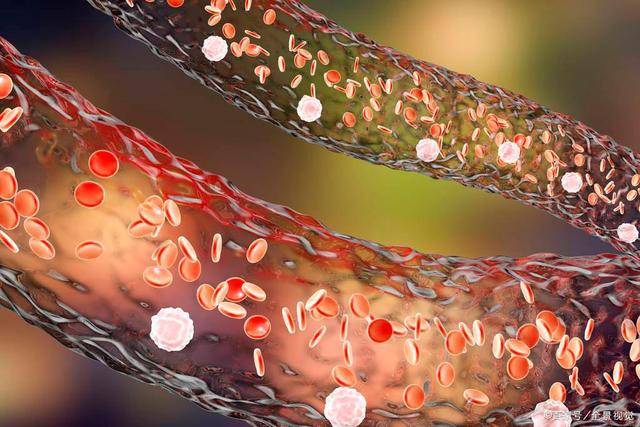Now people often hear about “thick blood.”
The reason for the appearance of thick blood is usually closely related to people’s emotional habits, age, blood composition, and so on. When a person has thick blood, there is a risk of blood clots.
The harm of blood clots is significant, and serious cases may endanger a person’s life, so we must observe changes in our body in a timely manner.
Waking up in the middle of the night with 4 anomalies suggests the presence of blood clots in the body.
Being awakened while asleep
Thick blood is prone to causing pulmonary embolism, which greatly affects the body’s oxygen intake level, leading to increased heart activity to provide enough oxygen to the body.
At the same time, the heart operates under high load, often causing symptoms of chest tightness, making it easy to feel breathless and be woken up.
Cold hands and feet
When we sleep, our hands and feet are relatively warm. If you often feel cold in your hands and feet while sleeping, it should be taken seriously.
If you are in a cold sleeping environment, cold hands and feet are normal and can be solved by covering yourself well. However, if your hands and feet remain cold in a warm sleeping environment, it is likely due to poor blood circulation, leading to embolism.
Blurred vision upon waking up
Some people find their vision to be blurry after waking up, which is often due to insufficient blood supply to the eyes.
Insufficient blood supply to the eyes is also due to thick blood, and this symptom usually slowly recovers if it’s not severe. However, if the condition persists for a long time and is accompanied by nausea, it may indicate blockage in the brain’s blood vessels.
Elderly people drool in their sleep
Drooling while sleeping is considered normal by many people, but excluding oral diseases and sleep postures, prolonged drooling is not normal.
If middle-aged and elderly people frequently drool while sleeping, it is likely due to blockage of blood vessels in the brain, affecting nerve control of tissues, resulting in drooling.
Maintain healthy blood vessels, remember the “three taboos” after meals:
Avoid sleeping immediately after meals. To achieve good effects, it’s essential to cultivate good lifestyle and eating habits, especially avoiding sleeping immediately after meals, as it increases the burden on blood vessels and digestion, which may hinder food absorption.
Sleeping right after meals not only leads to weight gain but also burdens blood vessels and exacerbates stomach digestion, which is detrimental to food absorption.
After a meal, blood flow to the stomach increases, causing insufficient blood supply to the brain, easily leading to localized cerebral ischemia.
Avoid smoking after meals. The harm of smoking after meals is more than 10 times higher than usual.
After eating, the circulation of blood in the digestive system speeds up. Smoking at this time leads to the absorption of harmful substances from tobacco, increasing the burden on blood vessels, brain, and heart.
Thus, smoking immediately after meals should be avoided, as it not only burdens the blood vessels but also increases the risk of vascular diseases.
Avoid immediate bathing after meals. Bathing when full after a meal can affect digestion and may increase the risk of sudden death. After a meal, the body’s digestive system starts working, with a large amount of blood circulating in the stomach while organs receive comparatively less blood flow.
Bathing immediately after a meal can result in uneven blood flow distribution, potentially leading to ischemia and hypoxia, increasing the risk of heart ischemia and vascular diseases.
To maintain healthy blood vessels, it’s important to develop good habits. Additionally, dietary methods can help improve blood flow and prevent vascular blockages.
A natural “thrombolytic agent” has been found, not onions and mushrooms. Incorporating onions and mushrooms in your diet is beneficial as they help cleanse blood vessels, improve vascular elasticity, and maintain vascular health. However, some foods are more effective in vascular health than onions and mushrooms.
Tartary buckwheat. Tartary buckwheat has high nutritional value for the body, improves vascular elasticity, keeps blood vessels clear, reduces clot formation, and prevents vascular sclerosis.
The rutin component in Tartary buckwheat is very helpful in maintaining vascular health. Drinking it regularly helps protect vascular health, prevent clot formation; hence, Tartary buckwheat is also known as a natural thrombolytic agent.
Walnuts. Walnuts not only benefit brain function but also have a powerful effect in protecting blood vessels. Walnuts are considered thrombolytic agents, facilitating faster blood circulation, protecting vascular health.
Walnuts contain antioxidants that help delay vascular aging, reduce vascular burden, and keep blood vessels clear. For individuals with hypertension and high blood lipids, consuming two to three walnuts daily can regulate blood lipids, protect blood vessels, and help prevent blood clots, ultimately retreating from difficulties.
To maintain vascular health, reduce vascular burden, in addition to dietary considerations, engage in regular physical exercise. Physical activities accelerate blood circulation by eliminating toxins and waste, keeping your blood vessels clear, and reducing the risk of vascular diseases.


